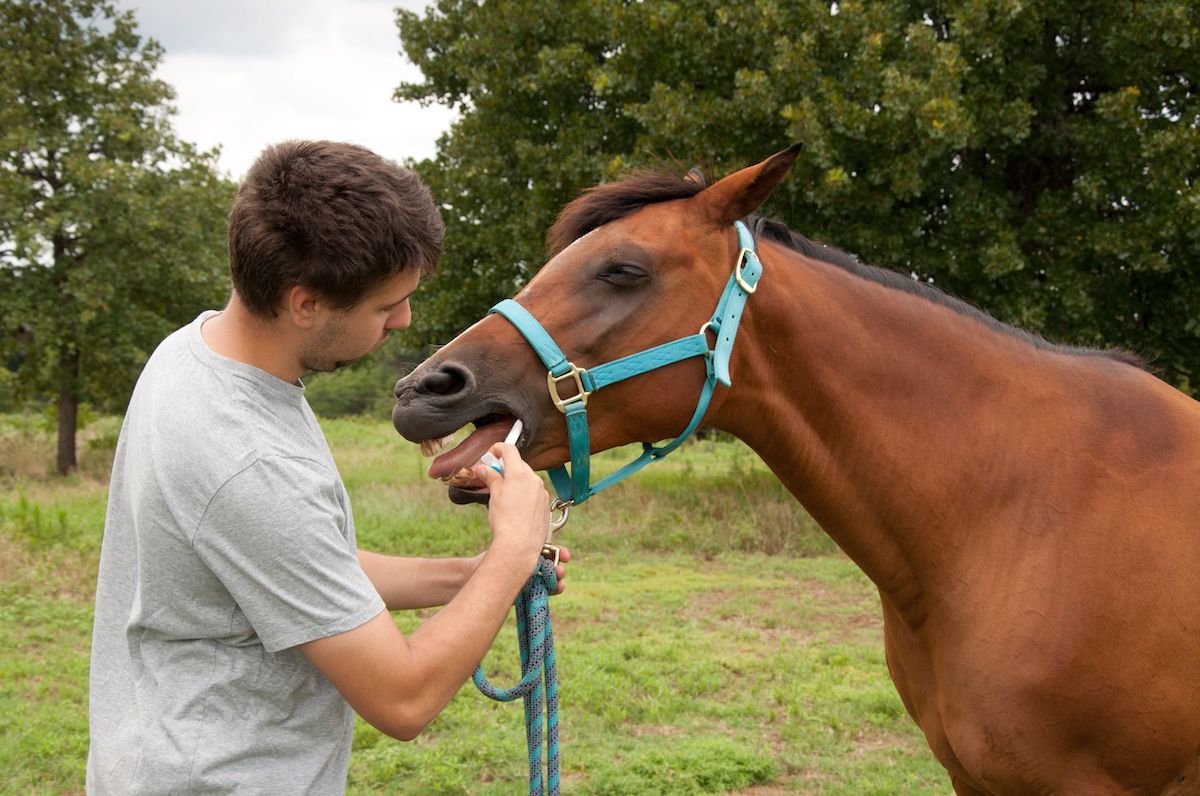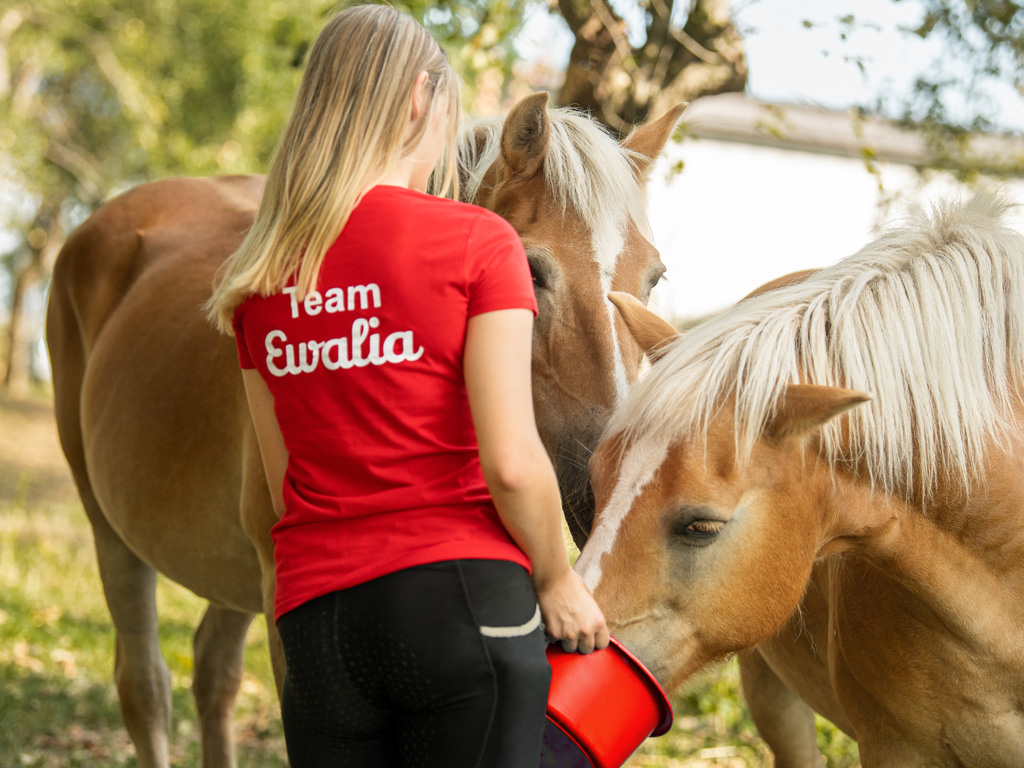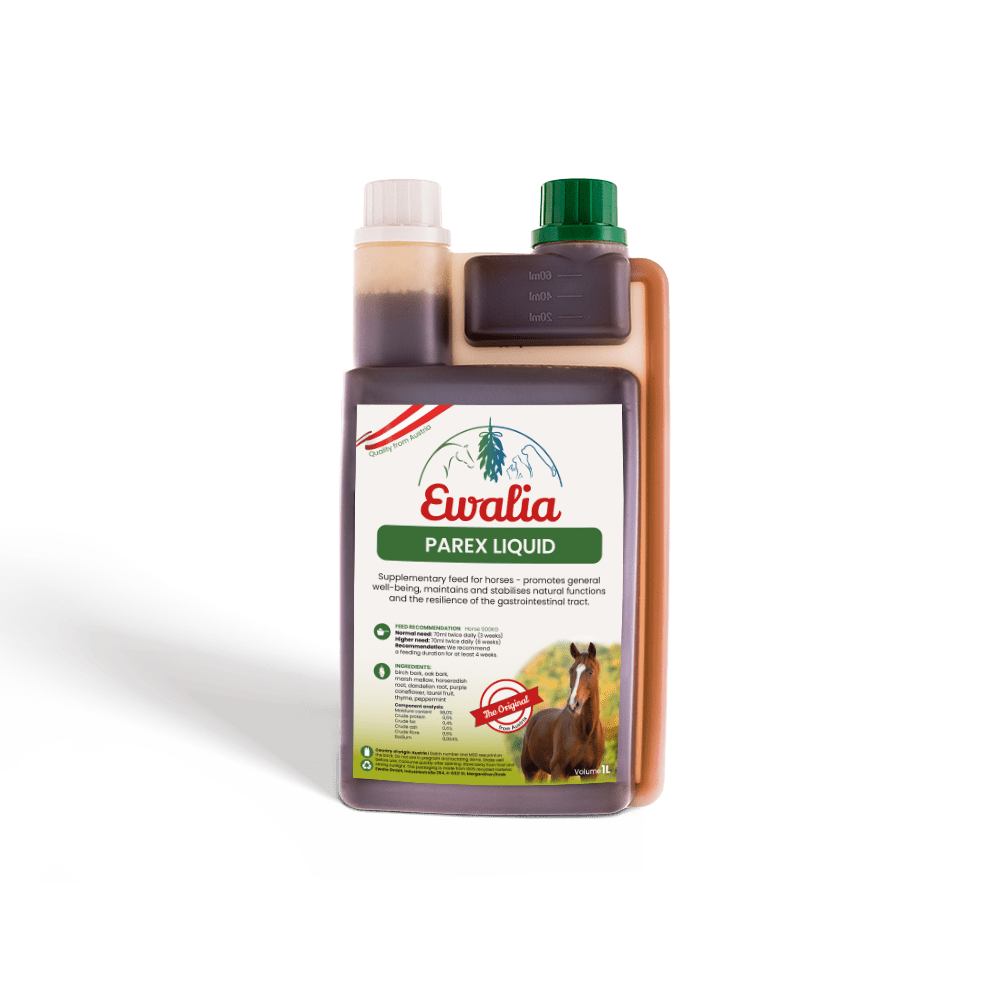Strategic, selective, or "natural" deworming?

Deworming your horse can be a tricky issue. How often? Which method? The conventional method of regularly treating the entire herd with a broad-spectrum wormer has made some worm species resistant to these chemical weapons. More success can be seen in targeted, selective deworming which reduces the use of chemicals. But are there effective alternatives? Discover here how your horse can better overcome the burden of stomach and intestinal parasites.
Why do horses have problems with worms?
Horses and worms have lived together in symbiosis since ancient times, and worms pose no real threat to wild horses. Weakened animals may suffer from parasites, but endoparasites actually stimulate the immune systems of healthy horses. Young animals who are subjected to only small numbers of parasites develop defences against worms.
Wild animals don't stay in one place for long and normally defecate on designated spots in their territories. Once the area is grazed, they move on, leaving the plant growth at their defecation spots standing. The plants growing there are eaten by other herbivores who are not susceptible to equine parasites. This keeps the parasite population down and allows wild animals free access to plants that strengthen their natural defences against endoparasites.
Our domesticated horses don't have unlimited pasture land available to them. They use the same pastures where they eat and defecate, year after year. Very few horse owners are able to employ rotational grazing or alternate keeping ruminants on contaminated pastures to let them recover. Our horses' parasite problems are therefore "man-made". Simply put, the horses ingest the worm larvae at pasture and excrete the parasites with their faeces. The worms return to the pasture where they are eaten again, and the cycle continues. The larvae of some endoparasite species can survive in pasture grass or underground for long periods, even in frost. Deworming treatments are designed to kill off stomach and intestinal parasites in all stages to break this cycle.
It's an age-old problem. Long ago, worm infestations were treated with preventive feeding of carrot or garlic or with magical "worm blessings" at the barn door, none of which had the desired effect. The deworming pastes used today are certainly less stressful for the organism than the old vinegar, eggshell, pepper and iron rust concoctions, and are less damaging to the horse's health than a massive worm infestation.
Which worm species are hazardous for horses?
Roundworms (nematodes)
Small strongyles (cyathostomes): These endoparasites are 0.04–0.14 mm in length and are the most widespread worm species. They nest in the mucosa of the gut and can lead to intestinal inflammation in large numbers, resulting in weight loss, watery stool, and colic.
Large strongyles burrow into the tissues in the horse's intestine in the larval stage, damaging blood vessels and organs. Strongylus vulgaris, aka blood worms, travel through the blood vessels via the intestinal artery and can cause thrombosis, killing off the intestinal tissue. Strongylus equinus enters the liver through the abdominal cavity and damages liver cells and the pancreas.
Horses with roundworm infestations excrete the worm eggs with their faeces. In spring and autumn when the weather is warm and humid, these eggs mature into larvae within 48 hours, then re-enter the horse's digestive tract by way of pasture grass or bedding.
Strongylides westeri, aka threadworms, can enter through the skin as well as through the digestive tract. Foals are especially threatened, as transmission frequently occurs via the mare's milk. Damage to the small intestine wall leads to absorption disorders, diarrhoea, and weight loss. If the infestation is not too large, young healthy horses develop natural defences against threadworms.
Equine roundworms (Ascarids)
These worms can be seen in a horse's faeces and can grow to 45 cm long. The eggs are excreted with the faeces and remain able to infect a horse for up to five years. The eggs often enter the horse through bedding and forage. The larvae begin growing in the horse's small intestine and then migrate to the liver and the lungs. When the horse coughs, the worms are swallowed and land back in the small intestine, where they mature and multiply. The immune system of a healthy horse will succeed in decimating the number of larvae during this body migration. Young horses up to about 15 months of age will often suffer roundworm infestations as they have not yet developed sufficient natural defences against ascarids. Massive infestation will result in weight loss – often with the typical "worm belly", scruffy coat, and colic caused by damage to the intestinal wall. Balls of roundworms in the intestine can cause constipation and intestinal obstruction.
Tapeworms (Anoplocephalidae)
Tapeworm larvae enter the horse's digestive tract through an intermediate host in the grass, the oribatid mite, and attach themselves to the gut wall, causing inflammations and presenting a risk of obstruction or rupture of the intestine. Tapeworms can grow up to 80 cm in length; their size alone can cause intestinal disturbances and even blockages.
Equine pinworms (Oxyuris equi)
This species is harmless in the horse's body. Pinworms attach their egg strings to the horse's anal region, causing severe itching and tail rubbing. This causes them to dry out and fall to the ground, where the horse ingests them orally. Unlike other worms, they do not attach to tissue, but move freely in the gut and back outside where they lay their eggs. These whitish worms can grow up to 10 cm long and can be seen on, rather than in, piles of faeces. Horses are often affected individually, and the infestation can be a sign of immune deficiency.
Bot larvae (Gasterophilus spp.)
Bot larvae are the larvae of the botfly, which lays its yellowish eggs on the horse's forelegs, chest, and shoulders. The horse nibbles at these spots and ingests the eggs, which then attach themselves to the gastric mucosa where they cause inflammations and associated digestive problems. After 8 to 10 months, the larvae exit in the faeces and then burrow into the earth, where they develop into pupa.
How to tell if your horse has worms
In most cases, a horse owner can determine whether a horse has worms without laboratory faecal testing. Signs of massive infestation include:
- dull coat
- weakness
- weight loss
- diminished performance
- loss of appetite
- colics
But a horse that appears fit can also have worms!
Now and then, roundworms or strongyles will be spontaneously eliminated along with faeces. This is actually a good sign, because the horse's immune system is actively preventing the worms from developing further.
The best method to find out if a horse has worms is to count the eggs by means of faecal testing. Ideally, a faecal sample – a dropping from one horse, or preferably small amounts from several droppings – should be collected directly after defecation, for example with a rubber glove that is turned inside out, sealed, and labelled. Various laboratory tests can allow the parasite stages present to be counted microscopically and can determine the parasite species. This will give you an idea of how many adult worms are in the horse's gut. A blood test can measure blood chemicals that are produced by inflammatory reactions from the colonisation of worm larvae in the organism. Tapeworms can be diagnosed through a saliva test. If pinworms are suspected, the eggs can be identified using the "adhesive tape method". Bot larvae don't show up in faecal samples but are easily detected in late summer and autumn by the bot eggs attached to the horse's hair.
How do wormers work? Can they hurt my horse?
Anthelmintics cause the death or paralysis of worms in the adult and/or larval stages in the horse's body. This reduces the excretion of eggs via the horse's faeces, lowering the infection load. Most of the active substances are absorbed through the intestinal mucosa and broken down in the liver, with no harm to the horse's gut flora.
However, these active substances are eliminated into the environment with the faeces and can pollute pastures and bodies of water. Some of these are toxic for water organisms.
A massive worm infestation will certainly harm the horse more than a professional chemical worming treatment will. Deworming medications must be prescribed by vets. Healthy horses will experience hardly any side effects. Like any medication, however, deworming puts a strain on the animal's organism and so should not be done without cause.
How often must I deworm my horse?
Many stables have all of their horses dewormed two to four times a year. The reason for this is because it is assumed that all the horses will be equally affected. This method, where the infection load in a herd is controlled at intervals, is called strategic deworming. Although not often done, it is recommended that regular faecal examinations be carried out which can include collective faecal samples from the herd.
Pros:
- For horse owners, the schedule is easy to follow once it's established.
- Strategic periodic treatment can be used for horses of all ages.
- Deworming at least twice a year effectively breaks the cycle of Strongylus vulgaris.
Cons:
- A collective faecal sample only determines the parasite status of the herd.
- Individual horses might be treated more often than necessary or, if infested with other worm species, given ineffective treatment.
- Repeated administration of broad-spectrum agents leads to progressive resistance, which the parasites then pass on to the next generation.
What is selective deworming and how does it work in practice?
Today we know that not all horses in a herd will suffer the same levels of infestation. It is estimated that one third of a horse population excretes 80% of parasites; for the rest, the parasite load is kept in balance by a stable immune system. In selective deworming, the administration of anthelmintics is adapted to each individual horse, with faecal samples from each adult horse in a herd regularly examined for parasites. Faecal tests are carried out for each horse four times in the first year; after that the number of samples can be reduced. Each horse undergoes an individual deworming scheme based on the findings. Another faecal test should be carried out 10 to 14 days after treatment to verify the effectiveness of the preparation used. Vets also recommend a "safety" deworming: at the end of the grazing season, all horses in the herd should be dewormed, even those that have not been treated throughout the year due to normal faecal test results.
Selective deworming is primarily directed at small strongyles, the most commonly found parasite in horses here. Horses found to have over 200 strongyle eggs per gramme of faeces should be dewormed. If equine roundworms are detected, the horse will need treatment regardless of the quantity of eggs. If one horse is found to have tapeworms, the entire herd needs to be dewormed.
Pros:
- Using the faecal samples taken from individual horses, it is possible to determine exactly which horse is infested with which type of worms. This facilitates targeted deworming.
- After the first year, the number of treatments can be reduced. The individual horses will then undergo less strain from medications, with fewer harmful substances released into the environment as well.
- Selective deworming is currently the most sustainable concept for counteracting resistance.
Cons:
- Faecal sample collection and individual worming schemes require more effort.
- This method is not suitable for foals and young horses under the age of four, nor in stables with large strongyle infestations.
Can worm infestations be prevented?
Next to deworming, good pasture hygiene and stable hygiene are crucial to fighting parasite infestations.
- Pastures ideally should be cleared of faeces every other day. Although this is time consuming, it's still the best way to reduce the number of eggs and larvae.
- Regular mowing and dragging, ideally in summer, kills worm larvae.
- Don't overcrowd pastures.
- If possible, rotate pastures to allow them recovery time.
- Alternate the herd with ruminants (not a feasible solution for everyone).
- Muck out boxes and paddocks daily.
- Avoid feeding forage and concentrate feed from the floor.
- Clean out feed mangers and hay racks regularly.
- Put newcomers in quarantine before allowing them to join the herd.
Are there alternatives to chemical worming treatments?
Although you'll find a number of deworming herbal mixtures or homoeopathic remedies being advertised, ultimately there is no getting around chemical deworming: there are no plants that horses can eat which will kill worms.
There are, however, a number of herbs that are effective in protecting horses from severe worm infestations by positively influencing the intestinal environment and inhibiting the proliferation of endoparasites. Other herbal active substances contribute to the regeneration of gastric and intestinal mucosa irritated by parasites and strengthen the horse's immune system.
How can I support my horse's natural defences against parasites?
You can help your horse to defend itself against worm infestation by feeding it herbs that promote a healthy and resistant intestinal mucosa and strengthen the immune system.
Birch and dandelion stimulate kidney activity and promote the excretion of harmful substances.
Turmeric is used to treat digestive disorders, strengthens the liver, and has anti-inflammatory and immunomodulatory effects.
Marsh-mallow supports the regeneration of gastric and intestinal mucosa.
Oak bark contains tannins, which have an astringent effect on mucous membranes, stimulate the secretion of digestive juices and strengthen the upper tissue layers.
Ginger relieves symptoms of worm infestation, promotes the secretion of gastric juice and stimulates the appetite.
Caution: Ginger can cause intestinal discomfort in sensitive animals.
Carrots have an anti-microbial effect and help to re-establish balance to gut flora after diarrhoea.
Garlic and echinacea activate the immune system.
Caution: One study has shown that excessive amounts of garlic can cause anaemia!
Horseradish root is high in vitamin C and boosts the immune system. It also contains glucosinolates, from which allyl mustard oil is derived.
Caution: Mustard oils are powerful irritants!
Thyme has antibacterial and antibiotic properties and stimulates the body's natural defences. Its essential oils can create an unpleasant environment in the gut for parasites.
Grape seed oil contains linoleic acid, which has antioxidant effects and which the organism needs for cell regeneration.
Wormwood is rich in bitter substances and prevents bloating associated with parasite infestation.
Caution: Follow manufacturer recommendations when feeding bitter substances, tannins, and mucosa-irritating substances. Do not exceed recommended doses!
Sources and further reading
- Bauer, C. (November 2019). Universität Gießen. Von Selektive Entwurmung Pferde: https://www.uni-giessen.de/fbz/fb10/institute_klinikum/institute/parasitologie/informationen abgerufen
- Brendieck-Worm, C., & Melzig, M. F. (2018). Phytotherapie in der Tiermedizin. Stuttgart: Georg Thieme Verlag KG.
- horse.com. (2020). Von horse-wormer-guide: https://www.horse.com/content/wormer/horse-wormer-guide/ abgerufen
- Laboklin. (April 2019). Von Labor für klinische Diagnostik: https://laboklin.com/de/infothek/weitere-laborinformationen/pferde-aussendungen/2019/april/ abgerufen
- Röhm, C., & Keck, N. (2019). Da ist der Wurm drin. Zeitgenössische selektive Entwurmung beim Pferd.














